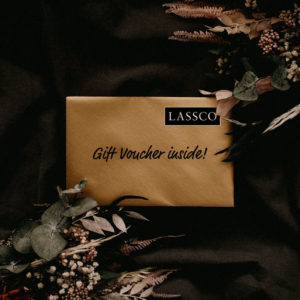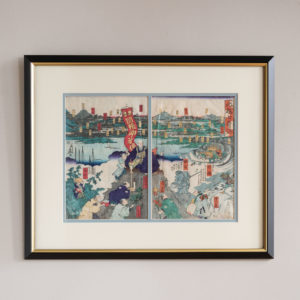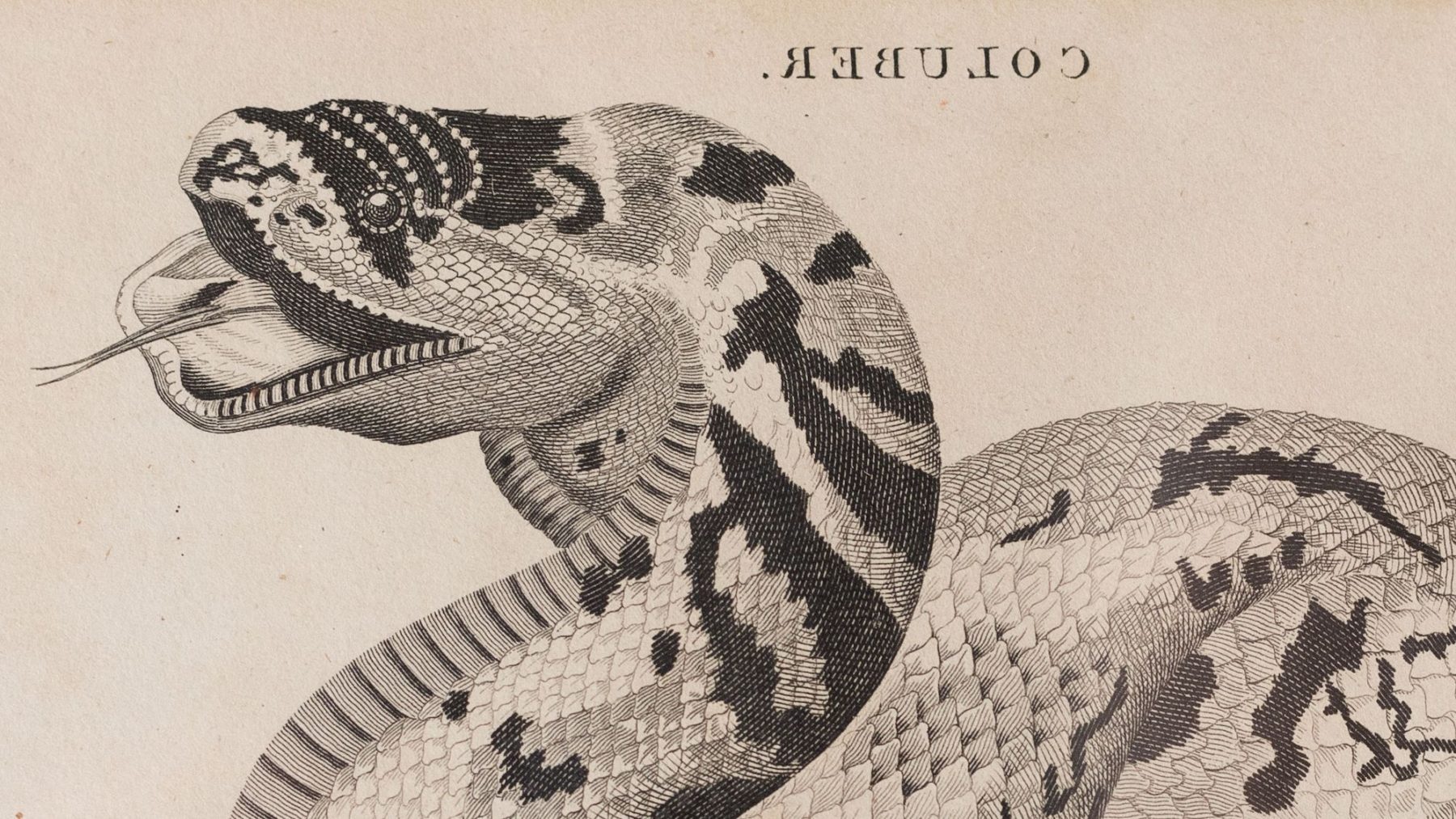
Prints
Bring life and colour to an interior with the inclusion of prints and art. Our selection provides a broad variety of lithographs and printed imagery. We specialise in natural history, plant and animal prints. Also collections of contemporary art including mid twentieth century artists like Picasso, Matisse and Braque. We also focus on maps of London including our local area Vauxhall, Central London and the River Thames.
966 items found
-
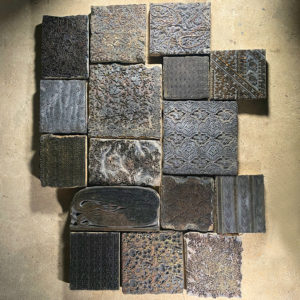
A quantity of Edwardian textile printing blocks
£3,200A quantity of Edwardian textile printing blocks
each thick board ornamented with delicate patterns of raised brass and steel, pins or blades, in order to create complex motifs for textile printing, the reverse with recessed grips for the printer to apply the inked (or stopped-out) block, most with bent corner-pins to prick the cloth in order to reference position subsequent prints,£3,200 -
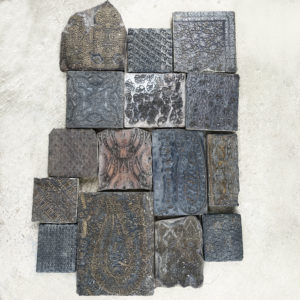
A quantity of Edwardian textile printing blocks
£3,000A quantity of Edwardian textile printing blocks
each thick board ornamented with delicate patterns of raised brass and steel, pins or blades, in order to create complex motifs for textile printing, the reverse with recessed grips for the printer to apply the inked (or stopped-out) block, most with bent corner-pins to prick the cloth in order to reference position subsequent prints,£3,000 -
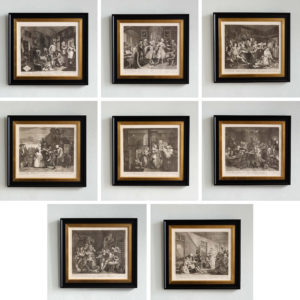
A Rake’s Progress after William Hogarth. A set of eight copper-engraved prints
£2,800 the set of eightA Rake’s Progress after William Hogarth. A set of eight copper-engraved prints
1803 Thomas Cook edition. Framed in black with a gold slip.£2,800 the set of eight -
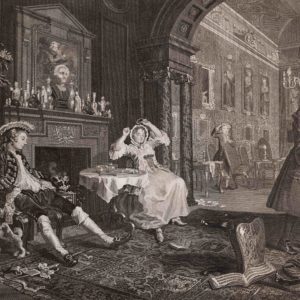
Marriage-a-la Mode, after William Hogarth. A set of six copper-engraved prints
£2,200 the set of sixMarriage-a-la Mode, after William Hogarth. A set of six copper-engraved prints
1803 Thomas Cook edition. Framed in black with a gold slip.£2,200 the set of six -
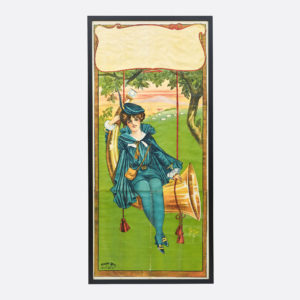
Little Boy Blue pantomime poster
£1,850 -
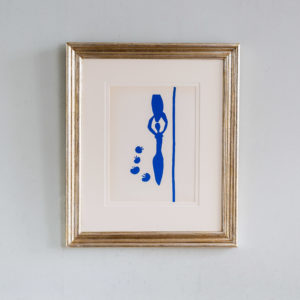
Henri Matisse, Nu Bleu I
£1,750 eachHenri Matisse, Nu Bleu I
The foreword states: 'This double number of Verve is entirely dedicated to the last works of Matisse - 1950-1954. Reproduced in colour lithography, these works have been realised by the artist with papers coloured in gouache, cut with scissors and pasted. They are shown here with drawings executed at the same time or during the preceding period. Matisse composed the cover specially for this volume. These first lithographic plates were printed during the year 1954 under his direction. The printing of the lithographs in colour by Mourlot Frères and that of the photogravure reproductions and the typography by the master printers Draeger Frères, was completed in Paris on the 28th day of July 1958.'£1,750 each -
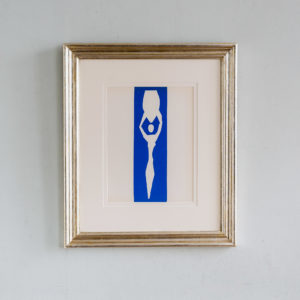
Henri Matisse, Nu Bleu II
£1,750 eachHenri Matisse, Nu Bleu II
The foreword states: 'This double number of Verve is entirely dedicated to the last works of Matisse - 1950-1954. Reproduced in colour lithography, these works have been realised by the artist with papers coloured in gouache, cut with scissors and pasted. They are shown here with drawings executed at the same time or during the preceding period. Matisse composed the cover specially for this volume. These first lithographic plates were printed during the year 1954 under his direction. The printing of the lithographs in colour by Mourlot Frères and that of the photogravure reproductions and the typography by the master printers Draeger Frères, was completed in Paris on the 28th day of July 1958.'£1,750 each -
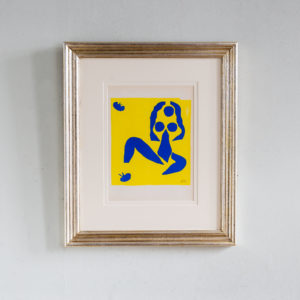
Henri Matisse, Nu Bleu IV
£1,750 eachHenri Matisse, Nu Bleu IV
The foreword states: 'This double number of Verve is entirely dedicated to the last works of Matisse - 1950-1954. Reproduced in colour lithography, these works have been realised by the artist with papers coloured in gouache, cut with scissors and pasted. They are shown here with drawings executed at the same time or during the preceding period. Matisse composed the cover specially for this volume. These first lithographic plates were printed during the year 1954 under his direction. The printing of the lithographs in colour by Mourlot Frères and that of the photogravure reproductions and the typography by the master printers Draeger Frères, was completed in Paris on the 28th day of July 1958.'£1,750 each -
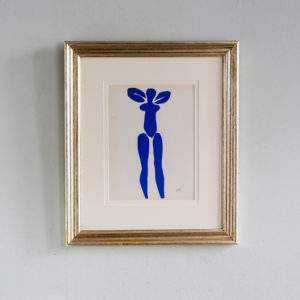
Henri Matisse, Nu Bleu X
£1,750 eachHenri Matisse, Nu Bleu X
The foreword states: 'This double number of Verve is entirely dedicated to the last works of Matisse - 1950-1954. Reproduced in colour lithography, these works have been realised by the artist with papers coloured in gouache, cut with scissors and pasted. They are shown here with drawings executed at the same time or during the preceding period. Matisse composed the cover specially for this volume. These first lithographic plates were printed during the year 1954 under his direction. The printing of the lithographs in colour by Mourlot Frères and that of the photogravure reproductions and the typography by the master printers Draeger Frères, was completed in Paris on the 28th day of July 1958.'£1,750 each -
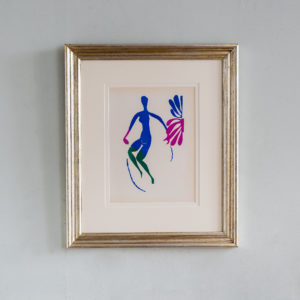
Henri Matisse, Nu Bleu V
£1,750 eachHenri Matisse, Nu Bleu V
The foreword states: 'This double number of Verve is entirely dedicated to the last works of Matisse - 1950-1954. Reproduced in colour lithography, these works have been realised by the artist with papers coloured in gouache, cut with scissors and pasted. They are shown here with drawings executed at the same time or during the preceding period. Matisse composed the cover specially for this volume. These first lithographic plates were printed during the year 1954 under his direction. The printing of the lithographs in colour by Mourlot Frères and that of the photogravure reproductions and the typography by the master printers Draeger Frères, was completed in Paris on the 28th day of July 1958.'£1,750 each -
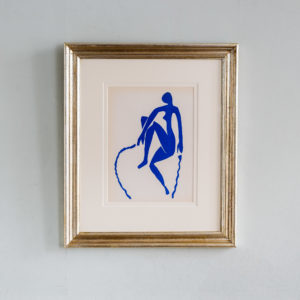
Henri Matisse, Nu Bleu VIII
£1,750 eachHenri Matisse, Nu Bleu VIII
The foreword states: 'This double number of Verve is entirely dedicated to the last works of Matisse - 1950-1954. Reproduced in colour lithography, these works have been realised by the artist with papers coloured in gouache, cut with scissors and pasted. They are shown here with drawings executed at the same time or during the preceding period. Matisse composed the cover specially for this volume. These first lithographic plates were printed during the year 1954 under his direction. The printing of the lithographs in colour by Mourlot Frères and that of the photogravure reproductions and the typography by the master printers Draeger Frères, was completed in Paris on the 28th day of July 1958.'£1,750 each -
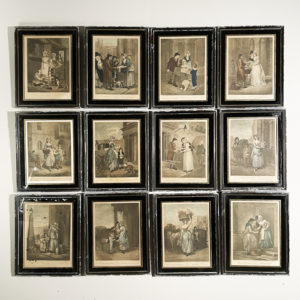
A set of 12 “Cries of London” framed hand-coloured engravings
£1,550 the setA set of 12 “Cries of London” framed hand-coloured engravings
each hand-coloured engraving, depicting a street-seller plying their wares, presented in Verre Eglomise frames, [Condition: the prints, faded, foxed and browned in places, the frames with losses and flaking to the Verre Eglomise]£1,550 the set -
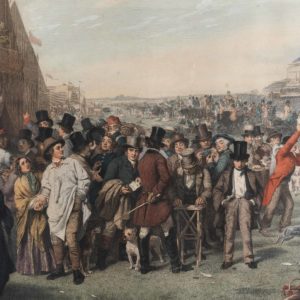
William Powell Frith ‘The Derby Day’
£1,450 -

Eagle Wharf, Whistler
£1,200Eagle Wharf, Whistler
A framed black-line etching by the American artist and engraver James MacNeil Whistler showing shipping off Eagle Wharf off Wapping in the Pool of London. Taken from 'A Series of Sixteen Etchings of Scenes on the Thames and Other Subjects', otherwise referred to as The Thames Set, the pictures were created over a period of 12 years starting in 1859 and finally published as a complete set by Ellis & Green in London in 1871.£1,200 -

The Dance, by Henri Matisse, Jan – March 1939 / No. 4.
£1,200The Dance, by Henri Matisse, Jan – March 1939 / No. 4.
The Verve Review was a purposefully luxurious. It ran from 1937 to 1960, but with only 38 editions available, due to the high degree of design and editorial work dedicated to each issue. Each edition contained unique lithographic prints, commissioned by the editor, and each cover a double-page lithograph elaborated by one of the artists contained within. It was the brainchild of its editor Stratis Eleftheriades, a Greek National who moved to Paris in the early thirties to take part in the growing Modernist movement, writing under the name of Teriade.£1,200 -
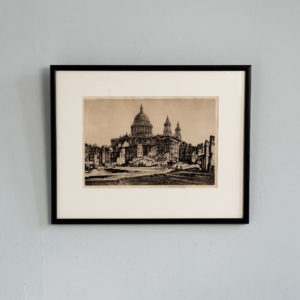
Henry Rushbury, St. Pauls from the North,
£1,200Henry Rushbury, St. Pauls from the North,
A signed and dated, framed and mounted drypoint engraving by Sir Henry Rushbury showing St Pauls Cathedral viewed over the bomb damaged remnant of what was Paternoster Row and London's printing district after the 'Worst Raid' of the London Blitz on the 10-11th of May 1941. First exhibited at the Royal Academy, Summer Exhibition in 1944, the print is one of a series by Sir Henry documenting the destruction of London landmarks during the Second World War.£1,200 -
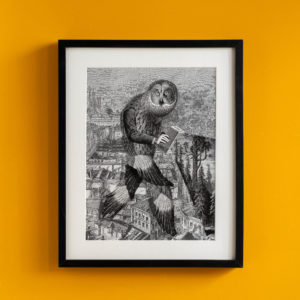
The Collector by Dan Hillier (1973-2024)
£950The Collector by Dan Hillier (1973-2024)
Dan Hillier captured the zeitgeist of the early noughties with his collages that combined Victorian source materials with human, animal, and arcane elements into mysterious surreal art works. Born in Oxfordshire he went on to study Illustration and Graphic Arts at Anglia Ruskin University in Cambridge, later living and working in Stoke Newington, London. Beginning to sell his prints from a market stall in East London he eventually attracting the attention of prestigious gallerists and commercial collaborators like Shakespeare’s Globe, Marc Jacobs, Louis Vuitton and the National Theatre. Dan's distinctive art graced the opening titles of the 2018 BBC drama series Requiem. He moved to Dartmoor in 2022 to be closer to his family and nature but sadly, Dan Hillier passed away in 2024 following a short illness.£950 -
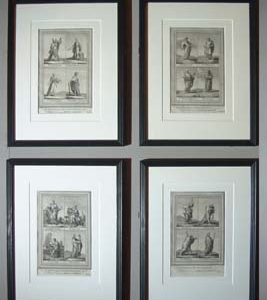
A set of four English prints
£920 the set of four -
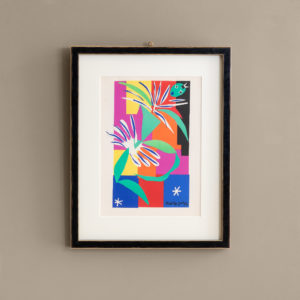
Henri Matisse, ‘The Last Works of Henri Matisse’
£900 eachHenri Matisse, ‘The Last Works of Henri Matisse’
From Verve Vol. IX No. 35/36 published by Tériade under the title 'The Last Works of Henri Matisse'£900 each -
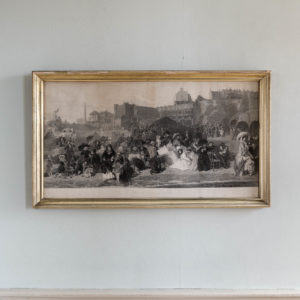
Ramsgate Sands by William Powell Frith
£900Ramsgate Sands by William Powell Frith
Original steel engraving published 1854. Presented in a gilt frame with lower margin title, trimmed to the image area£900 -
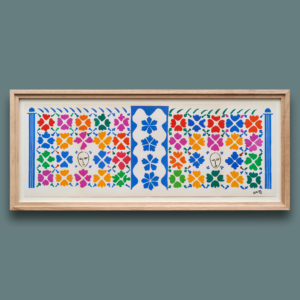
Verve, ‘The Last Works of Henri Matisse’,
£900Verve, ‘The Last Works of Henri Matisse’,
'Decoration - Masques' from Verve Vol. IX No. 35/36 published by Tériade under the title 'The Last Works of Henri Matisse', float mounted in a limed oak frame.£900 -
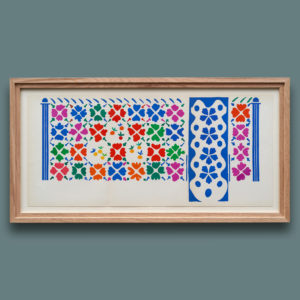
Verve, ‘The Last Works of Henri Matisse’,
£900Verve, ‘The Last Works of Henri Matisse’,
'Decoration - Fruits' from Verve Vol. IX No. 35/36 published by Tériade under the title 'The Last Works of Henri Matisse'.£900 -
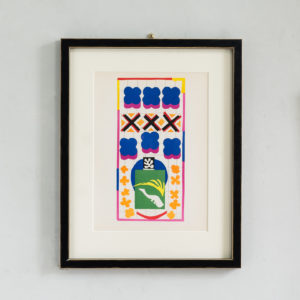
Henri Matisse, ‘The Last Works of Henri Matisse’
£900 eachHenri Matisse, ‘The Last Works of Henri Matisse’
From Verve Vol. IX No. 35/36 published by Tériade under the title 'The Last Works of Henri Matisse'£900 each -
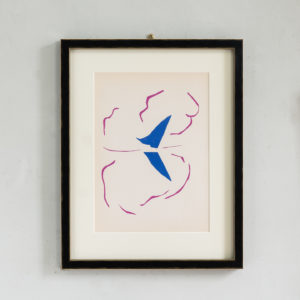
Henri Matisse, ‘The Last Works of Henri Matisse’
£900 eachHenri Matisse, ‘The Last Works of Henri Matisse’
From Verve Vol. IX No. 35/36 published by Tériade under the title 'The Last Works of Henri Matisse'£900 each -
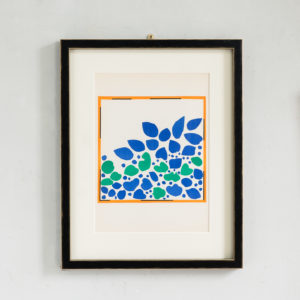
Henri Matisse, ‘The Last Works of Henri Matisse’
£900 eachHenri Matisse, ‘The Last Works of Henri Matisse’
From Verve Vol. IX No. 35/36 published by Tériade under the title 'The Last Works of Henri Matisse'£900 each -
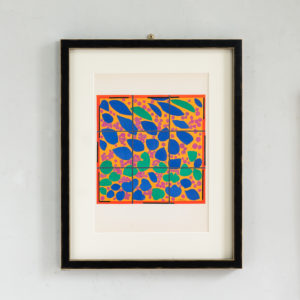
Henri Matisse, ‘The Last Works of Henri Matisse’
£900 eachHenri Matisse, ‘The Last Works of Henri Matisse’
From Verve Vol. IX No. 35/36 published by Tériade under the title 'The Last Works of Henri Matisse'£900 each -
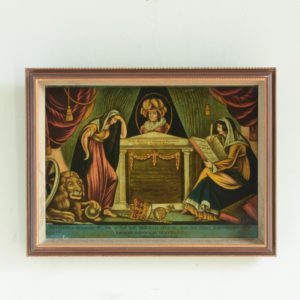
Rare example of a reversed engraving on glass, depicting Caroline of Brunswick, made c1821
£900Rare example of a reversed engraving on glass, depicting Caroline of Brunswick, made c1821
Reverse glass printing is a process whereby a print is transferred to a sheet of glass, varnished and coloured to resemble an oil painting.
The Prince of Wales, son of King George III was introduced to his potential bride, Caroline of Brunswick out of need for money as he was in great debt. Caroline famously, short, fat, ugly and never changed her undergarments, and rarely washed. Her body odour was overwhelming.
Caroline was very popular with the London public whilst King George was not. Every day when attending the House of Lords her coach was escorted by the cheering mob. George IV’s Coronation was to be the 29th April 1821 but Caroline was told that she would not be taking part in it. Undaunted Caroline arrived at the door of Westminster Abbey on the day demanding to be admitted, but the doors were slammed in her face.
She died 19 days after her frustrated attempt to get into the Abbey and was buried in Brunswick, and on her coffin was inscribed… ‘CAROLINE THE INJURED QUEEN OF ENGLAND’.
£900 -
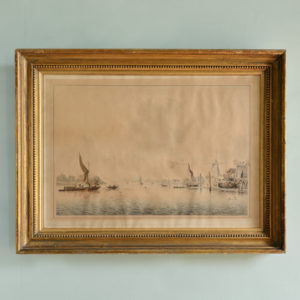
Randalls Mill by John Clevely,
£900 -
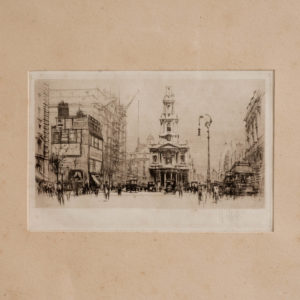
The Strand, William Walcot
£850The Strand, William Walcot
Framed and mounted black line etching by the artist-engraver William Walcot showing the The Strand during the construction of the Aldwych in 1924. Issued as part of Walcot's London Set at the height of his success.£850 -
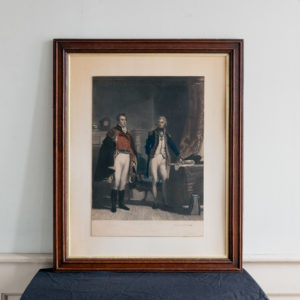
The Army and Navy Nelson & Wellington,
£850The Army and Navy Nelson & Wellington,
A hand coloured engraving By S.W. Reynolds after a painting by John Prescott Knight showing the only meeting between Arthur Wellesley Duke of Wellington and Admiral Lord Horatio Nelson, which took place in September, 1805 at the Colonial Office on Downing Street in London.£850 -
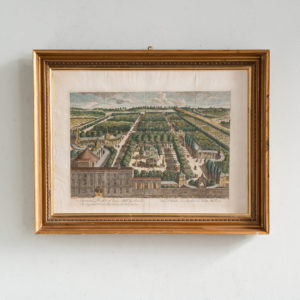
A General Prospect of Vaux Hall Gardens. Shewing at one View the disposition of the whole Gardens. Vüe Détaillee des Jardins de Vaux Hall.
£850A General Prospect of Vaux Hall Gardens. Shewing at one View the disposition of the whole Gardens. Vüe Détaillee des Jardins de Vaux Hall.
Originally engraved by William Simpkins (fl.1784-1825) for Owen Manning and William Bray’s “History and Antiquities of Surrey” (1804-1814).£850 -
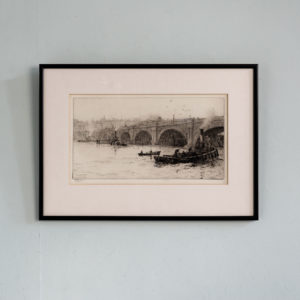
W. L Wylie R. A., Old Waterloo Bridge from the South Bank,
£850W. L Wylie R. A., Old Waterloo Bridge from the South Bank,
An original dry-point engraving by British marine artist, painter etcher and illustrator W. L. Wyllie (1851-1931) showing Old Waterloo Bridge from the Surrey shore with three steam Toshers working on the Lambeth Reach of the River Thames. Mounted and in its original frame. Old Waterloo bridge, designed and built by the engineer John Rennie was built in 1827 and stood until 1924 when the increased scour of the river, caused by the removal of the many-piered Old London Bridge, made necessary its dismantling and replacement. Signed by the artist in pencil in he margin.£850 -
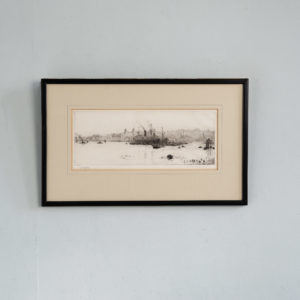
W. L Wylie R. A., Sugar boats Greenwich Reach,
£850W. L Wylie R. A., Sugar boats Greenwich Reach,
An original dry-point engraving by British marine artist, painter etcher and illustrator W. L. Wyllie (1851-1931). Signed in pencil by the artist "A view of Greenwich from the Isle of Dogs (i.e. the north-west) with figures, probably local boys, swimming off the beach in the foreground around a small lighter. The Royal Naval College is to the left and the Royal Observatory high in the background above the Park and the riverside town centre of Greenwich proper. In the centre cargo ships are unloading sugar into lighters alongside, in the deep-water mooring tier between Greenwich and Deptford. The atmosphere beyond over the shoreline is one of industrial haze through which a Thames barge, chimneys and a crane can be seen. Astern of the ships small steamers cluster off Greenwich Pier." National Maritime Museum listing.£850 -
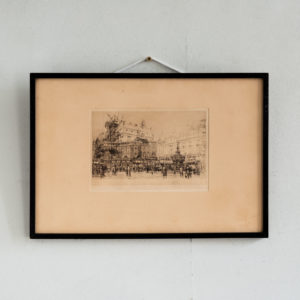
The Reconstruction of Piccadilly, William Walcot
£840The Reconstruction of Piccadilly, William Walcot
Framed and mounted black line etching by the artist-engraver William Walcot showing the rebuilding of Picadilly Circus and the Swan and Edgar building following destruction by Zeppelin raid in 1917. Issued as part of Walcot's London Set in 1924.£840 -
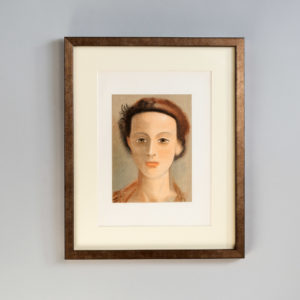
Portrait by Andre Derain, Verve Vol 2 / No. 5-6.
£800Portrait by Andre Derain, Verve Vol 2 / No. 5-6.
The Verve Review was a purposefully luxurious. It ran from 1937 to 1960, but with only 38 editions available, due to the high degree of design and editorial work dedicated to each issue. Each edition contained unique lithographic prints, commissioned by the editor, and each cover a double-page lithograph elaborated by one of the artists contained within. It was the brainchild of its editor Stratis Eleftheriades, a Greek National who moved to Paris in the early thirties to take part in the growing Modernist movement, writing under the name of Teriade.£800 -
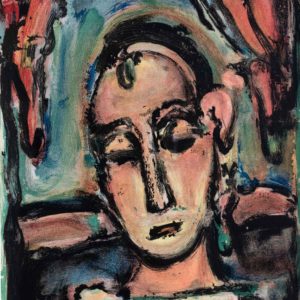
Head of a Girl by George Rouault, Verve Vol 2 / No. 5-6.
£800Head of a Girl by George Rouault, Verve Vol 2 / No. 5-6.
The Verve Review was a purposefully luxurious. It ran from 1937 to 1960, but with only 38 editions available, due to the high degree of design and editorial work dedicated to each issue. Each edition contained unique lithographic prints, commissioned by the editor, and each cover a double-page lithograph elaborated by one of the artists contained within. It was the brainchild of its editor Stratis Eleftheriades, a Greek National who moved to Paris in the early thirties to take part in the growing Modernist movement, writing under the name of Teriade.£800 -
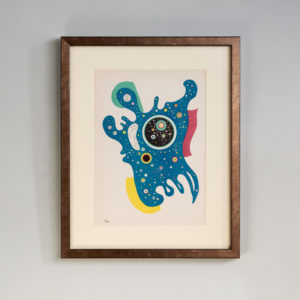
Stars by Wassily Kandinsky, Verve Vol. 1 / No. 2.
£800Stars by Wassily Kandinsky, Verve Vol. 1 / No. 2.
The Verve Review was a purposefully luxurious. It ran from 1937 to 1960, but with only 38 editions available, due to the high degree of design and editorial work dedicated to each issue. Each edition contained unique lithographic prints, commissioned by the editor, and each cover a double-page lithograph elaborated by one of the artists contained within. It was the brainchild of its editor Stratis Eleftheriades, a Greek National who moved to Paris in the early thirties to take part in the growing Modernist movement, writing under the name of Teriade.£800 -
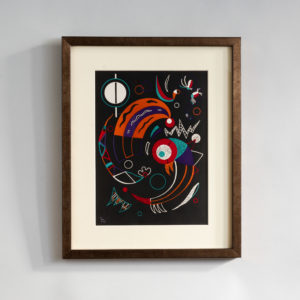
Comets by Wassily Kandinsky, Verve Vol. 1 / No. 2.
£800Comets by Wassily Kandinsky, Verve Vol. 1 / No. 2.
The Verve Review was a purposefully luxurious. It ran from 1937 to 1960, but with only 38 editions available, due to the high degree of design and editorial work dedicated to each issue. Each edition contained unique lithographic prints, commissioned by the editor, and each cover a double-page lithograph elaborated by one of the artists contained within. It was the brainchild of its editor Stratis Eleftheriades, a Greek National who moved to Paris in the early thirties to take part in the growing Modernist movement, writing under the name of Teriade.£800 -
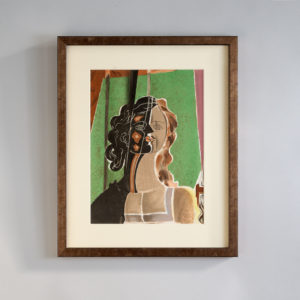
Figure by Georges Braque, Verve Vol 2 / No. 5-6.
£800Figure by Georges Braque, Verve Vol 2 / No. 5-6.
The Verve Review was a purposefully luxurious. It ran from 1937 to 1960, but with only 38 editions available, due to the high degree of design and editorial work dedicated to each issue. Each edition contained unique lithographic prints, commissioned by the editor, and each cover a double-page lithograph elaborated by one of the artists contained within. It was the brainchild of its editor Stratis Eleftheriades, a Greek National who moved to Paris in the early thirties to take part in the growing Modernist movement, writing under the name of Teriade.£800 -
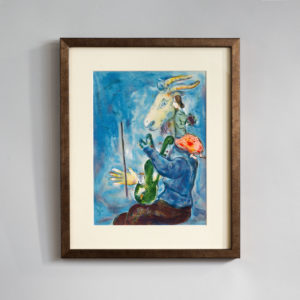
Printemps by Marc Chagall, Verve Vol. 1 / No. 3.
£800Printemps by Marc Chagall, Verve Vol. 1 / No. 3.
The Verve Review was a purposefully luxurious. It ran from 1937 to 1960, but with only 38 editions available, due to the high degree of design and editorial work dedicated to each issue. Each edition contained unique lithographic prints, commissioned by the editor, and each cover a double-page lithograph elaborated by one of the artists contained within. It was the brainchild of its editor Stratis Eleftheriades, a Greek National who moved to Paris in the early thirties to take part in the growing Modernist movement, writing under the name of Teriade.£800 -
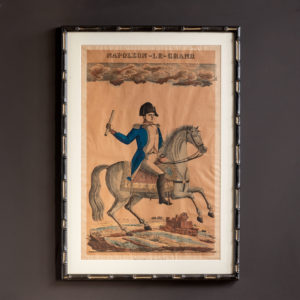
Napoleon-Le-Grand
£800Napoleon-Le-Grand
Jean-Charles Pellerin (1756 - 1836) was a French illustrator, artist, and printer. Born in Epinal, France.£800 -
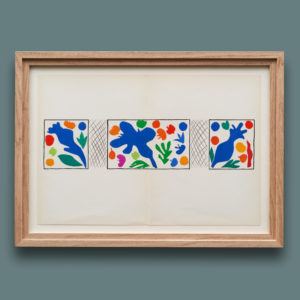
Verve, ‘The Last Works of Henri Matisse’,
£800Verve, ‘The Last Works of Henri Matisse’,
'Coquelicots' from Verve Vol. IX No. 35/36 published by Tériade under the title 'The Last Works of Henri Matisse', float mounted in a limed oak frame.£800 -
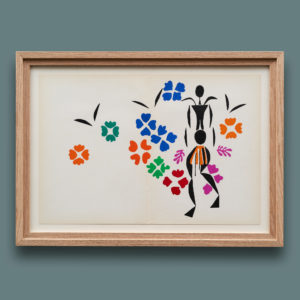
Verve, ‘The Last Works of Henri Matisse’,
£800Verve, ‘The Last Works of Henri Matisse’,
'La Negresse' from Verve Vol. IX No. 35/36 published by Tériade under the title 'The Last Works of Henri Matisse', float mounted in a limed oak frame.£800 -
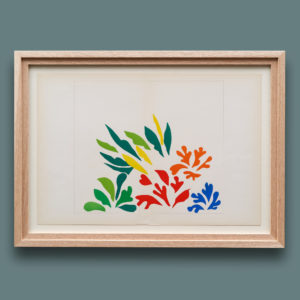
Verve, ‘The Last Works of Henri Matisse’,
£800Verve, ‘The Last Works of Henri Matisse’,
'Acanthes' from Verve Vol. IX No. 35/36 published by Tériade under the title 'The Last Works of Henri Matisse', float mounted in a limed oak frame.£800 -
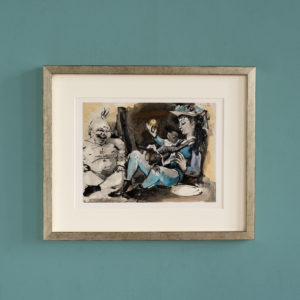
Picasso and the Human Comedy, Verve, Vol. VIII, No 29/30, 1954
£795 eachPicasso and the Human Comedy, Verve, Vol. VIII, No 29/30, 1954
Original lithograph print from Verve Vol. VIII, No 29/30 printed by the Master Printers Mourlot Frères in 1954. Framed in champagne gold with a cream mount.£795 each -
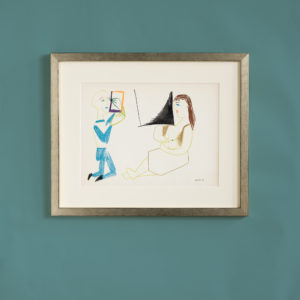
Picasso and the Human Comedy, Verve, Vol. VIII, No 29/30, 1954
£795 eachPicasso and the Human Comedy, Verve, Vol. VIII, No 29/30, 1954
Original lithograph print from Verve Vol. VIII, No 29/30 printed by the Master Printers Mourlot Frères in 1954. Framed in champagne gold with a cream mount.£795 each -
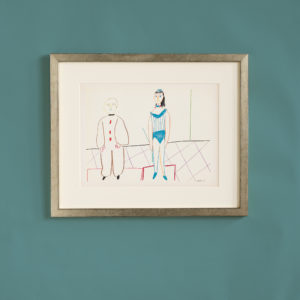
Picasso and the Human Comedy, Verve, Vol. VIII, No 29/30, 1954
£795 eachPicasso and the Human Comedy, Verve, Vol. VIII, No 29/30, 1954
Original lithograph print from Verve Vol. VIII, No 29/30 printed by the Master Printers Mourlot Frères in 1954. Framed in champagne gold with a cream mount.£795 each -
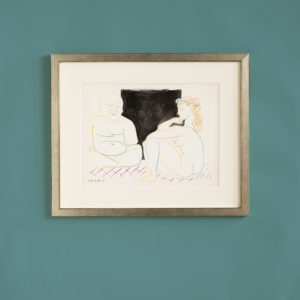
Picasso and the Human Comedy, Verve, Vol. VIII, No 29/30, 1954
£795 eachPicasso and the Human Comedy, Verve, Vol. VIII, No 29/30, 1954
Original lithograph print from Verve Vol. VIII, No 29/30 printed by the Master Printers Mourlot Frères in 1954. Framed in champagne gold with a cream mount.£795 each -
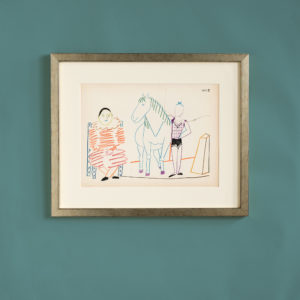
Picasso and the Human Comedy, Verve, Vol. VIII, No 29/30, 1954
£795 eachPicasso and the Human Comedy, Verve, Vol. VIII, No 29/30, 1954
Original lithograph print from Verve Vol. VIII, No 29/30 printed by the Master Printers Mourlot Frères in 1954. Framed in champagne gold with a cream mount.£795 each -
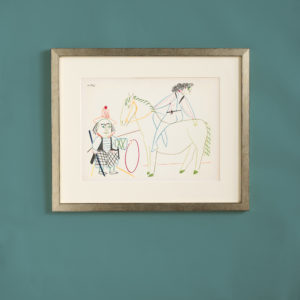
Picasso and the Human Comedy, Verve, Vol. VIII, No 29/30, 1954
£795 eachPicasso and the Human Comedy, Verve, Vol. VIII, No 29/30, 1954
Original lithograph print from Verve Vol. VIII, No 29/30 printed by the Master Printers Mourlot Frères in 1954. Framed in champagne gold with a cream mount.£795 each -
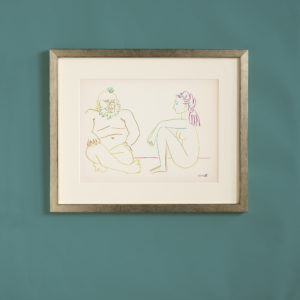
Picasso and the Human Comedy, Verve, Vol. VIII, No 29/30, 1954
£795 eachPicasso and the Human Comedy, Verve, Vol. VIII, No 29/30, 1954
Original lithograph print from Verve Vol. VIII, No 29/30 printed by the Master Printers Mourlot Frères in 1954. Framed in champagne gold with a cream mount.£795 each -
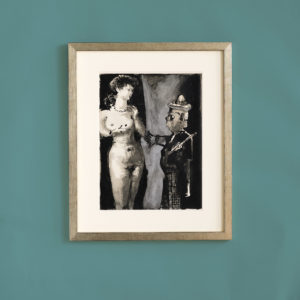
Picasso and the Human Comedy, Verve, Vol. VIII, No 29/30, 1954
£795 eachPicasso and the Human Comedy, Verve, Vol. VIII, No 29/30, 1954
Original lithograph print from Verve Vol. VIII, No 29/30 printed by the Master Printers Mourlot Frères in 1954. Framed in champagne gold with a cream mount.£795 each -
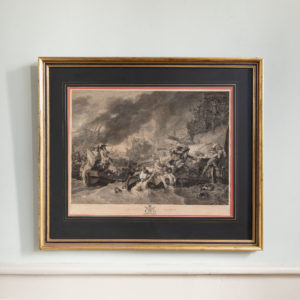
The Battle at La Hogue
£750The Battle at La Hogue
A large framed and mounted black line engraving by William Wollett afer the painting by Benjamin West showing the Anglo-Dutch naval victory at La Hogue off the coast of Normandy in 1692. " Standing in a boat at the left ... Vice Admiral George Rooke embodies heroic command with his upright posture and raised sword... Beached in the center distance is the French flagship, the Royal Sun. Actually burned and sunk a few days before this encounter, the Royal Sun is here deliberately refloated -- only to be run against the cliffs so that West might symbolize the French defeat." U.S. National Gallery of Art, Washington D.C.£750 -
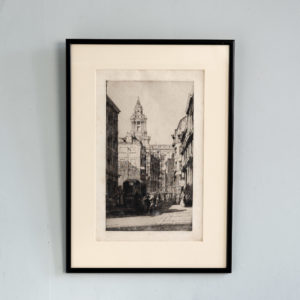
Nathaniel Sparks, The Clock Tower, St. Pauls,
£750Nathaniel Sparks, The Clock Tower, St. Pauls,
Mounted and in its original frame, an original dry-point engraving by the artist and painter-etcher Nathaniel Sparks showing the Clock Tower of St Paul's Cathedral viewed from Carter Lane. The first clock was inserted into the Great West Portico of St Paul's by Smith of Derby in 1893 and is still maintained by them to this day. Signed by the artist on the plate. Presented in a black frame with a cream mount.£750 -
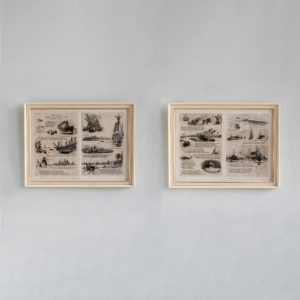
Our Fathers, To The Memory of the Nameless Killed and Wounded
£725 the pairOur Fathers, To The Memory of the Nameless Killed and Wounded
A set of four etchings in two frames depicting ships of war and life at sea in English history By William Wylie and accompanied by the words of Cpt. Ronald Hopwood's poem Our Fathers. William Lionel Wylie was the most distinguished marine artist of the late nineteenth and early twentieth centuries. He became almost a painter laureate to the Royal Navy, so much so that during his funeral, in a scene reminiscent of Nelson's state funeral in 1806, his body was rowed up Portsmouth Harbour in a naval cutter past battleships with dipped colours and bugles calling and quaysides lined with dockyard workers. Similarly Captain Ronald A Hopwood was described as the poet laureate of the Royal Navy by Time Magazine in 1941. His most enduring work, The Laws of the Navy, became and remains a sort of Works and Days primer for naval life, both inspiring and edifying seamen in the ways of the senior service. After the Battle of Jutland in 1916 when the press was critical of an apparent failure by the Royal Navy to achieve a clear victory against the Imperial German Navy the Times of London published The Old Ways, a poem by Hopwood and within this was a further poem, Our Fathers which was first written during the naval manoeuvres of 1913. Wyllie, we are told, was much taken with the verses and he arranged to illustrate them with the agreement of their author as a memorial of sorts to the dead (and perhaps as an apologia for the living) of the Battle of Jutland. The seaplane depicted appears to be a short type 184 used at Gallipoli where it became the first aircraft in the world to attack an enemy ship with an air-launched torpedo. The Battleship in the next image is of the King George V class and likely to be based on HMS Audacious, which Wylie had studied previously. The poem and illustrative etchings then go back in time to the navy of Elizabeth I's time. The sailing ships depicted are galleons of the type which chased the Spanish Armada out of the channel, a scene depicted at the bottom of the first print. The second framed picture depicts naval exercises and gunnery practice, with a galleon being scraped and caulked by hand on a secluded beach in the Spanish Main. It concludes with a scene of high-technology Super-Dreadnoughts of the Queen Elizabeth class - a naval nominative choice which perhaps inspires the scheme of the whole work of reflection.£725 the pair -
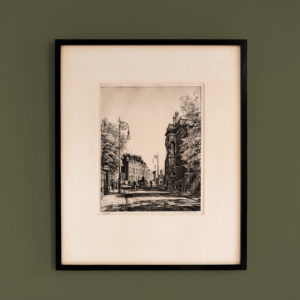
Poplar
£650Poplar
An original framed and mounted dry-point engraving by the artist engraver Frances Dodd RA showing Poplar Old Town hall on Newby Place in 1930. Hand signed in pencil by the artist.£650 -
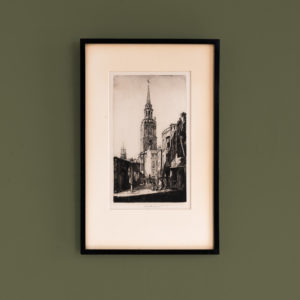
St. James’s Church Clerkenwell
£650St. James’s Church Clerkenwell
A framed and mounted black line etching by the English artist Sir Henry Rushbury KCVO CBE RA (28 October 1889 – 5 July 1968) depicting St James's Church Clerkenwell. Signed in pencil by the artist. Clerkenwell contained a notorious slum at the turn of the 20h Century and was the setting for George Gissing's Novel, The Netherworld - "Opposite, the shapes of poverty-eaten houses and grimy workshops stood huddling in the obscurity. From near at hand came shrill voices of children chasing each other about – children playing at midnight between slum and gaol!"£650 -
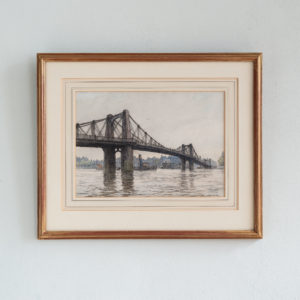
Lambeth Bridge With Shipping
£650Lambeth Bridge With Shipping
Pedestrians idle on the parapet of Old Lambeth Bridge while a steam tug passes beneath the central arch towing a Thames barge. Warehouses, wharves and houses line the Westminster shore. A Framed and mounted mixed media sketch by the artist Hubert Williams showing Old Lambeth Bridge prior to it's demolition in 1928. Signed on the plate by the artist.£650 -
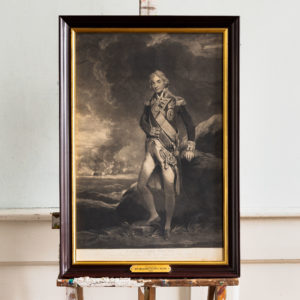
Admiral Lord Nelson at Copenhagen,
£650Admiral Lord Nelson at Copenhagen,
A framed mezzotint engraving of Admiral Lord Nelson at the battle of Copenhagen by Charles Turner, after John Hoppner. From the collection of Sir John Malcolm Fraser, 1st Baronet, journalist, Royal Naval captain, and vice-chairman of the Conservative Party.£650 -
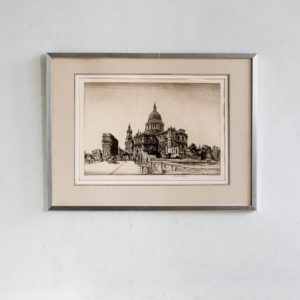
St. Paul’s Cathedral from Cannon Street
£625St. Paul’s Cathedral from Cannon Street
A famed drypoint engraving of a bomb-damaged St Pauls viewed from Cannon Street dated 1942 by the War Artist Sir Henry Rushbury KCVO CBE RA (28 October 1889 – 5 July 1968). Signed and dated by the artist.£625 -
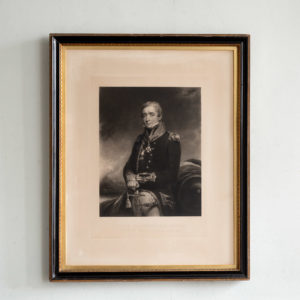
Captain Sir Christopher Cole,
£605Captain Sir Christopher Cole,
A framed portrait engraving by George H Phillips from the painting by William Owen R.A. showing the Naval Officer an statesman Captain Sir Christopher Cole.£605 -
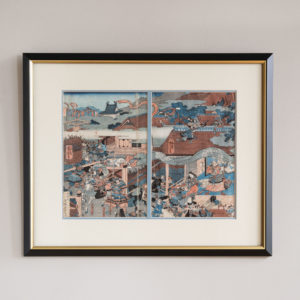
Japanese Woodblock Diptych.
£600 -
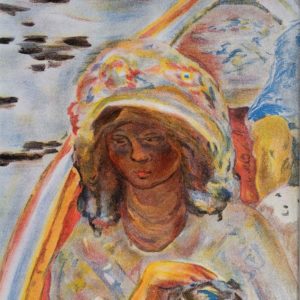
Portrait Fragment by Pierre Bonnard, Verve Vol 2 / No. 5-6.
£600Portrait Fragment by Pierre Bonnard, Verve Vol 2 / No. 5-6.
The Verve Review was a purposefully luxurious. It ran from 1937 to 1960, but with only 38 editions available, due to the high degree of design and editorial work dedicated to each issue. Each edition contained unique lithographic prints, commissioned by the editor, and each cover a double-page lithograph elaborated by one of the artists contained within. It was the brainchild of its editor Stratis Eleftheriades, a Greek National who moved to Paris in the early thirties to take part in the growing Modernist movement, writing under the name of Teriade.£600 -
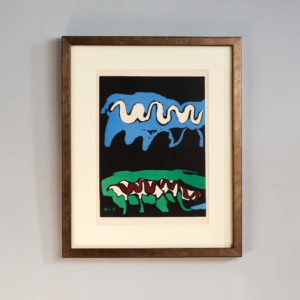
The Four Elements, Earth by Francisco Bores, Verve Vol. 1 / No. 1.
£600The Four Elements, Earth by Francisco Bores, Verve Vol. 1 / No. 1.
The Verve Review was a purposefully luxurious. It ran from 1937 to 1960, but with only 38 editions available, due to the high degree of design and editorial work dedicated to each issue. Each edition contained unique lithographic prints, commissioned by the editor, and each cover a double-page lithograph elaborated by one of the artists contained within. It was the brainchild of its editor Stratis Eleftheriades, a Greek National who moved to Paris in the early thirties to take part in the growing Modernist movement, writing under the name of Teriade.£600 -
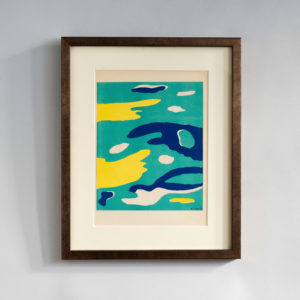
The Four Elements, Water by Fernand Leger, Verve Vol. 1 / No. 1.
£600The Four Elements, Water by Fernand Leger, Verve Vol. 1 / No. 1.
The Verve Review was a purposefully luxurious. It ran from 1937 to 1960, but with only 38 editions available, due to the high degree of design and editorial work dedicated to each issue. Each edition contained unique lithographic prints, commissioned by the editor, and each cover a double-page lithograph elaborated by one of the artists contained within. It was the brainchild of its editor Stratis Eleftheriades, a Greek National who moved to Paris in the early thirties to take part in the growing Modernist movement, writing under the name of Teriade.£600 -
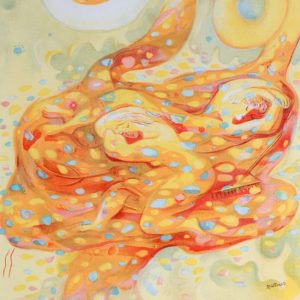
Autumn by Abraham Rattner, Verve Vol. 1 / No. 3.
£600Autumn by Abraham Rattner, Verve Vol. 1 / No. 3.
The Verve Review was a purposefully luxurious. It ran from 1937 to 1960, but with only 38 editions available, due to the high degree of design and editorial work dedicated to each issue. Each edition contained unique lithographic prints, commissioned by the editor, and each cover a double-page lithograph elaborated by one of the artists contained within. It was the brainchild of its editor Stratis Eleftheriades, a Greek National who moved to Paris in the early thirties to take part in the growing Modernist movement, writing under the name of Teriade.£600 -
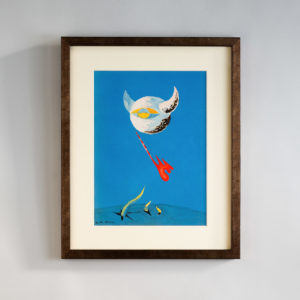
The Moon by André Masson, Verve Vol. 1 / No. 2.
£600The Moon by André Masson, Verve Vol. 1 / No. 2.
The Verve Review was a purposefully luxurious. It ran from 1937 to 1960, but with only 38 editions available, due to the high degree of design and editorial work dedicated to each issue. Each edition contained unique lithographic prints, commissioned by the editor, and each cover a double-page lithograph elaborated by one of the artists contained within. It was the brainchild of its editor Stratis Eleftheriades, a Greek National who moved to Paris in the early thirties to take part in the growing Modernist movement, writing under the name of Teriade.£600 -
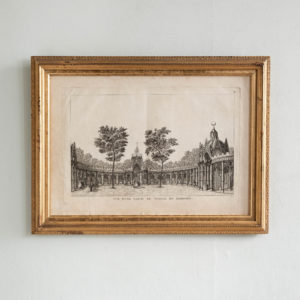
Vue D’une partie du Voxhal de Londres
£600Vue D’une partie du Voxhal de Londres
The Temple of Comus was named… after the god of cheer and good food. The building, which, although primarily devoted to dining, allowed for the appreciation of the arts and music as well as polite conversation in civilised surroundings. Initially, the building was “classical in style, with a colonnade of Ionic columns supporting a straight entablature, topped with urn finials; the semicircle flowed in a smooth curve out of the straight colonnade of the northern range of supper-boxes.” However, the designer also incorporated Gothic arches and “broad-ramped scrolls that acted as buttresses for the dome” and other unorthodox details. “The apparent breaking of architectural rules, mingling different styles in the same building, was deliberate and entirely typical of the unorthodox design of the English Rococo, which aimed to create playful, light-hearted works.”
£600 -
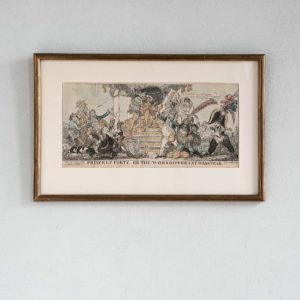
Princely Piety, or the worshippers at Wanstead,
£595Princely Piety, or the worshippers at Wanstead,
A hand-coloured etching by the caricaturist George Cruikshank depicting the wooing of a wealthy young heiress by a cast of reprobate suitors. Upon the death of her only brother James at the age of 11 in 1805 Catherine Tylney-Long became the richest commoner in England in her own right. At the tender of of 16 the 'Wiltshire Heiress' had come into a fortune of nearly £30,000,000 in today's money. This made the poor girl a prime target for every fortune hunter and indebted rake in England who wished to clear his creditors. The law as it stood in the early 19th Century had degenerated to such a degree that, under the principle of coverture, it denied a married woman any property at all in her own right while her legal existence as a feme covert was entirely subsumed in that of her husband. This left the wealthy orphan daughter of Sir James Tylney long, 7th Baronet in a difficult and precarious position, caught between the social stigma attached to unmarried womanhood and the appeals of a host of insinuating cads seeking her hand in marriage. Here Cruikshank depicts the many and assorted indigent suitors for the hand of the wealthy heiress. To the left of the dais are shown Lord Kilworth and William Wesley-Pole, later 4th Earl of Mornington a dissipated Anglo-Irish nobleman, who dueled over the courtship of Catherine. Kneeling at the foot of the steps we may also see the figure of Romeo Coates, unintentionally comic actor and 'improver' of Shakespeare included apparently 'not because of his pretensions, but his boasts and wishes'. Above him we see the fop and jobbing playwright, Sir Lumley Skeffington laying his poetic efforts at the feet of the heiress. On the right hand we see The Duke of Clarence, later William IV who by this point had debts of many hundreds of thousands of pounds holding back Baron-de-Geramb, a Spanish military adventurer and suspected Napoleonic spy who later became a Trappist monk where he used his position as procurator-general of that ancient order to defray his personal expenses. Above the Duke we see reproving the figure of Mrs Jordan, his 'common-law' wife with whom he had fathered many children at his retreat of Bushey Park. The farcical presentation of the situation belies it's tragic outcome. Perhaps cajoled by just such unkind insinuations as are repeated in this caricature Catherine would choose the worst-of-the-bunch, William Wesley-Pole, as her preferred suitor. William Wesley-Pole-Tylney-Long, as he became by Royal Licence in 1812, was an unredeemed rake and not only abused and impoverished his saintly young wife but also passed her a debilitating infection and caused her family seat at Wanstead House to be demolished and sold for salvage. After a short and unhappy marriage Catherine died at the age of only 35 after receiving a final brutal letter from her estranged husband, the contents of which apparently caused her to have some form of seizure. Frustrated in his efforts to gain custody of their son William, on whom the family fortune had devolved, William Pole Tylney-Long-Wellesley, 4th Earl of Mornington (the final name by which he was known) died in 1857 unwept, unhonoured and unsung if also unrepentant. His obituary in the Morning Star described him as "A spendthrift, a profligate, and a gambler in his youth, he became debauched in his manhood... redeemed by no single virtue, adorned by no single grace, his life gone out even without a flicker of repentance".£595 -
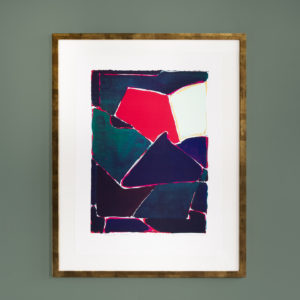
Black Hill, by Gordon House
£575 eachBlack Hill, by Gordon House
Gordon House was a graphic designer and abstract painter. He went to art school in Luton, then later, won a scholarship to St. Albans. During the 1950’s he spent much time in Letchworth, Welwyn and working for Imperial Chemical Industries (ICI) becoming aware of a modernist style of graphics through the design of European pharmaceutical packaging. This style was new to British eyes at the time and he went on to design the graphics for many galleries during the 1960’s. Mixing in new circles he collaborated with leading artists like Peter Blake and Richard Hamilton. He was responsible for the white on white emboss of the band’s name across the record sleeve on the Beatles White album against the wishes of Hamilton, who wanted to leave the sleeves totally blank, save for the stamp of a unique issue number. The Tate Gallery holds more than 100 of his prints and his work is also represented in many important public collections including the Arts Council, the British Council, the Victoria & Albert Museum and the M.O.M.A. in New York.£575 each -
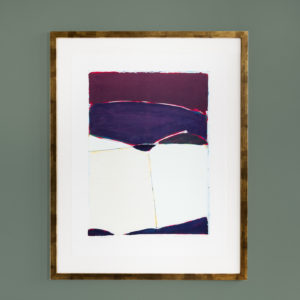
Black Hill, Pages, by Gordon House
£575 eachBlack Hill, Pages, by Gordon House
Gordon House was a graphic designer and abstract painter. He went to art school in Luton, then later, won a scholarship to St. Albans. During the 1950’s he spent much time in Letchworth, Welwyn and working for Imperial Chemical Industries (ICI) becoming aware of a modernist style of graphics through the design of European pharmaceutical packaging. This style was new to British eyes at the time and he went on to design the graphics for many galleries during the 1960’s. Mixing in new circles he collaborated with leading artists like Peter Blake and Richard Hamilton. He was responsible for the white on white emboss of the band’s name across the record sleeve on the Beatles White album against the wishes of Hamilton, who wanted to leave the sleeves totally blank, save for the stamp of a unique issue number. The Tate Gallery holds more than 100 of his prints and his work is also represented in many important public collections including the Arts Council, the British Council, the Victoria & Albert Museum and the M.O.M.A. in New York.£575 each -
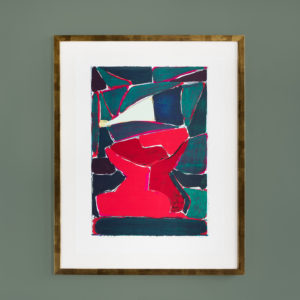
Black Hill, Rostra, by Gordon House
£575 eachBlack Hill, Rostra, by Gordon House
Gordon House was a graphic designer and abstract painter. He went to art school in Luton, then later, won a scholarship to St. Albans. During the 1950’s he spent much time in Letchworth, Welwyn and working for Imperial Chemical Industries (ICI) becoming aware of a modernist style of graphics through the design of European pharmaceutical packaging. This style was new to British eyes at the time and he went on to design the graphics for many galleries during the 1960’s. Mixing in new circles he collaborated with leading artists like Peter Blake and Richard Hamilton. He was responsible for the white on white emboss of the band’s name across the record sleeve on the Beatles White album against the wishes of Hamilton, who wanted to leave the sleeves totally blank, save for the stamp of a unique issue number. The Tate Gallery holds more than 100 of his prints and his work is also represented in many important public collections including the Arts Council, the British Council, the Victoria & Albert Museum and the M.O.M.A. in New York.£575 each -
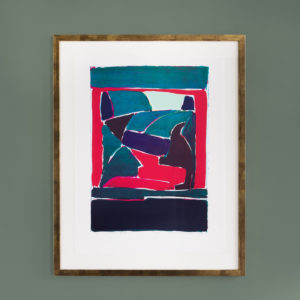
Black Hill, Work Shop, by Gordon House
£575 eachBlack Hill, Work Shop, by Gordon House
Gordon House was a graphic designer and abstract painter. He went to art school in Luton, then later, won a scholarship to St. Albans. During the 1950’s he spent much time in Letchworth, Welwyn and working for Imperial Chemical Industries (ICI) becoming aware of a modernist style of graphics through the design of European pharmaceutical packaging. This style was new to British eyes at the time and he went on to design the graphics for many galleries during the 1960’s. Mixing in new circles he collaborated with leading artists like Peter Blake and Richard Hamilton. He was responsible for the white on white emboss of the band’s name across the record sleeve on the Beatles White album against the wishes of Hamilton, who wanted to leave the sleeves totally blank, save for the stamp of a unique issue number. The Tate Gallery holds more than 100 of his prints and his work is also represented in many important public collections including the Arts Council, the British Council, the Victoria & Albert Museum and the M.O.M.A. in New York.£575 each -
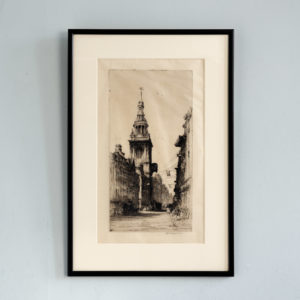
Nathaniel Sparks, St Mary-le-Bow, Cheapside,
£570Nathaniel Sparks, St Mary-le-Bow, Cheapside,
An original dry-point engraving by the artist and painter-etcher Nathaniel Sparks showing the steeple of St Mary le Bow viewed looking west up Cheapside. Signed by the artist. Presented in a cream mount and black frame.£570 -
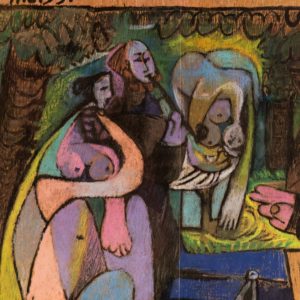
Pablo Picasso, Lithograph based on Edouard Manet’s, Luncheon on the the Grass. c1962
£550Pablo Picasso, Lithograph based on Edouard Manet’s, Luncheon on the the Grass. c1962
From 1959-1962 Pablo Picasso and his second wife Jacqueline lived at Château de Vauvenargues near Aix-en-Provence. He spent most of his time of his time on 140 drawings and 27 paintings, lino-cuts and cardboard models all on the theme of Manet’s, Le Déjeuner sur l’herbe. Manet's original painting from 1862 showing a nude woman sitting between two fully clothed men was a scandal for the time.£550 -
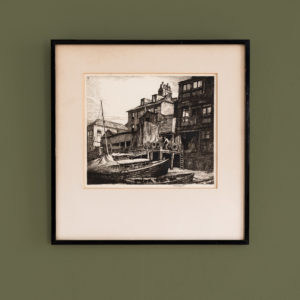
Buildings & Boats
£550Buildings & Boats
A framed and mounted black line etching by the artist-engraver Norman Jones RWS RE RSMA, showing a riverside wharf scene in the Lower Pool of the River Thames, possibly corresponding to the river frontage of Narrow Street, Limehouse. Signed in pencil by the artist.£550 -
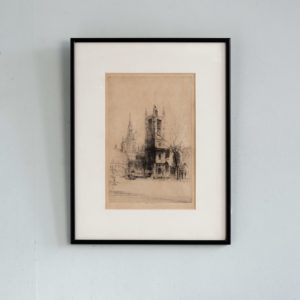
Frederick Farrell, St. Margarets Church, Westminster,
£550Frederick Farrell, St. Margarets Church, Westminster,
A framed and mounted original etching by Frederick Arthur Farrell depicting St Margaret's Church Westminster from across Parliament Square. Hand signed by the artist in pencil.£550 -
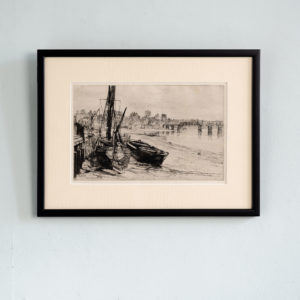
Charles Watson, Chelsea
£550Charles Watson, Chelsea
A framed and mounted etching by the English artist Charles Watson (1846-1927) depicting the foreshore at Chelsea with two barges at low tide. In the distance is shown the tower of Chelsea Old Church and a part of Old Battersea Bridge, replaced in 1890. The vantage is from close to the current site of the Chelsea Yacht and Boat Yard. Signed on the plate.£550 -
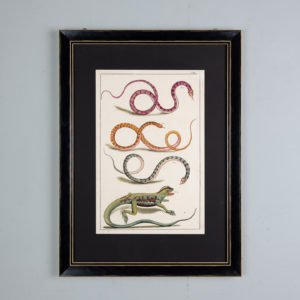
Snakes by Albertus Seba (1665-1736)
£540 eachSnakes by Albertus Seba (1665-1736)
Published to illustrate Seba's 'cabinet of curiosities' Framed£540 each -
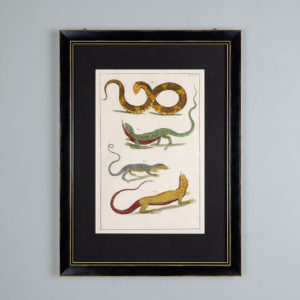
Snakes by Albertus Seba (1665-1736)
£540 eachSnakes by Albertus Seba (1665-1736)
Published to illustrate Seba's 'cabinet of curiosities' Framed£540 each -
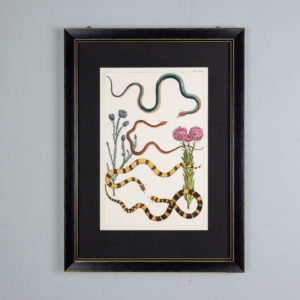
Snakes by Albertus Seba (1665-1736)
£540 eachSnakes by Albertus Seba (1665-1736)
Published to illustrate Seba's 'cabinet of curiosities' Framed£540 each -
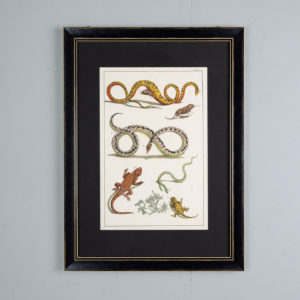
Snakes by Albertus Seba (1665-1736)
£540 eachSnakes by Albertus Seba (1665-1736)
Published to illustrate Seba's 'cabinet of curiosities' Framed£540 each -
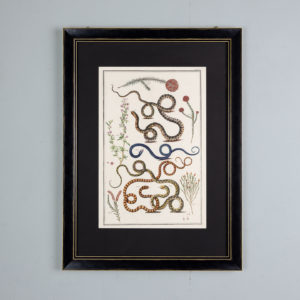
Snakes by Albertus Seba (1665-1736)
£540 eachSnakes by Albertus Seba (1665-1736)
Published to illustrate Seba's 'cabinet of curiosities' Framed£540 each -
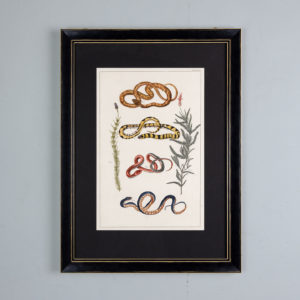
Snakes by Albertus Seba (1665-1736)
£540 eachSnakes by Albertus Seba (1665-1736)
Published to illustrate Seba's 'cabinet of curiosities' Framed£540 each -
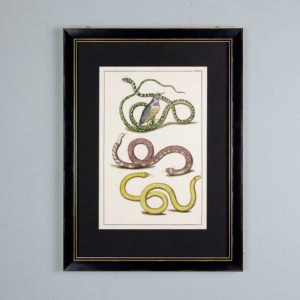
Snakes by Albertus Seba (1665-1736)
£540 eachSnakes by Albertus Seba (1665-1736)
Published to illustrate Seba's 'cabinet of curiosities' Framed£540 each -
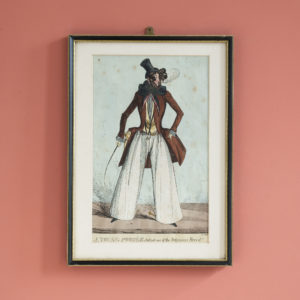
‘A Young Poodle, but not one of the Sagacious Breed’
£520‘A Young Poodle, but not one of the Sagacious Breed’
Caricaturist, presumably of Irish background, but undocumented. Responsible for a small number of plates in a distinctive hand. Unclear whether he etched them all or only designed them. Never a publisher. Worked for P.Roberts and J.Aitken. Many unsigned prints by both men may well be by him.£520 -
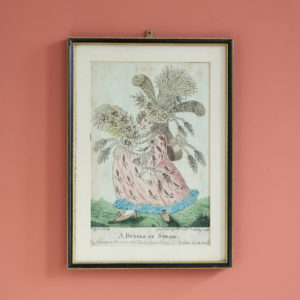
A Bundle of Straw, My Spouse is Remarkable Tasty in his Dress & he likes to see me so.
£520A Bundle of Straw, My Spouse is Remarkable Tasty in his Dress & he likes to see me so.
Caricaturist, presumably of Irish background, but undocumented. Responsible for a small number of plates in a distinctive hand. Unclear whether he etched them all or only designed them. Never a publisher. Worked for P.Roberts and J.Aitken. Many unsigned prints by both men may well be by him.£520 -
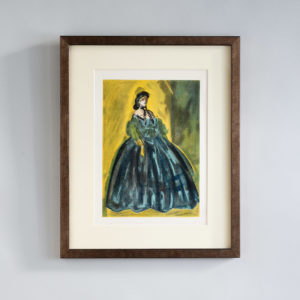
Portraits Part II by Constantin Guys, Verve Vol 2 / No. 5-6.
£500Portraits Part II by Constantin Guys, Verve Vol 2 / No. 5-6.
The Verve Review was a purposefully luxurious. It ran from 1937 to 1960, but with only 38 editions available, due to the high degree of design and editorial work dedicated to each issue. Each edition contained unique lithographic prints, commissioned by the editor, and each cover a double-page lithograph elaborated by one of the artists contained within. It was the brainchild of its editor Stratis Eleftheriades, a Greek National who moved to Paris in the early thirties to take part in the growing Modernist movement, writing under the name of Teriade.£500 -
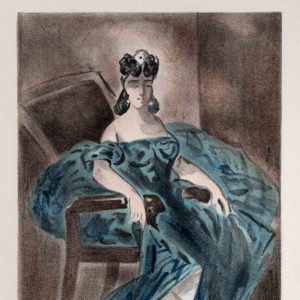
Portraits Part I by Constantin Guys, Verve Vol 2 / No. 5-6.
£500Portraits Part I by Constantin Guys, Verve Vol 2 / No. 5-6.
The Verve Review was a purposefully luxurious. It ran from 1937 to 1960, but with only 38 editions available, due to the high degree of design and editorial work dedicated to each issue. Each edition contained unique lithographic prints, commissioned by the editor, and each cover a double-page lithograph elaborated by one of the artists contained within. It was the brainchild of its editor Stratis Eleftheriades, a Greek National who moved to Paris in the early thirties to take part in the growing Modernist movement, writing under the name of Teriade.£500 -
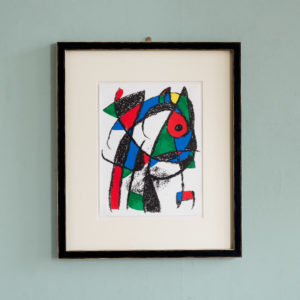
Joan Miró, Lithographie originale
£500Joan Miró, Lithographie originale
Joan Miró produced nearly 1,800 original lithographs and prints at the Maeght studio. He composed his score, invented his alphabet, scattered his symbols across the white page of his writing, close to graffiti. Everything was free, released, aerial, penetrated with interior light. He celebrated marriages between all techniques. Nothing was ever excessive or gratuitous. His creation cut to the essential. Miró created his own language. Dots, lines, scratches, graffiti, writing, mysterious anthropomorphic figures swimming or flying through infinite territory, fed by sparks. The power of black, awestruck colors… And the paper always defended its whiteness. Miró was about drawing above all else. His energy burst on to the sheet.£500 -
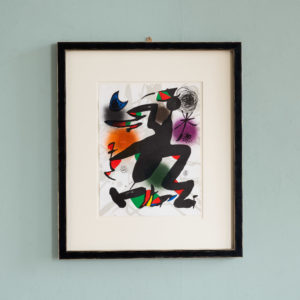
Joan Miró, Lithographie originale
£500Joan Miró, Lithographie originale
Joan Miró produced nearly 1,800 original lithographs and prints at the Maeght studio. He composed his score, invented his alphabet, scattered his symbols across the white page of his writing, close to graffiti. Everything was free, released, aerial, penetrated with interior light. He celebrated marriages between all techniques. Nothing was ever excessive or gratuitous. His creation cut to the essential. Miró created his own language. Dots, lines, scratches, graffiti, writing, mysterious anthropomorphic figures swimming or flying through infinite territory, fed by sparks. The power of black, awestruck colors… And the paper always defended its whiteness. Miró was about drawing above all else. His energy burst on to the sheet.£500 -
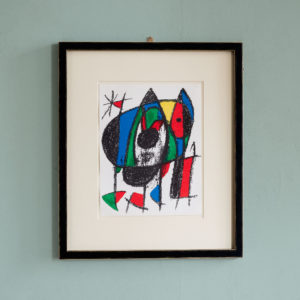
Joan Miró, Lithographie originale
£500Joan Miró, Lithographie originale
Joan Miró produced nearly 1,800 original lithographs and prints at the Maeght studio. He composed his score, invented his alphabet, scattered his symbols across the white page of his writing, close to graffiti. Everything was free, released, aerial, penetrated with interior light. He celebrated marriages between all techniques. Nothing was ever excessive or gratuitous. His creation cut to the essential. Miró created his own language. Dots, lines, scratches, graffiti, writing, mysterious anthropomorphic figures swimming or flying through infinite territory, fed by sparks. The power of black, awestruck colors… And the paper always defended its whiteness. Miró was about drawing above all else. His energy burst on to the sheet.£500 -
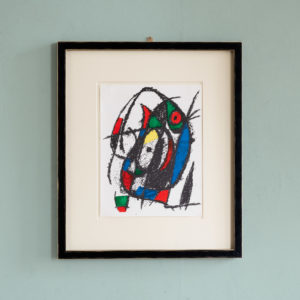
Joan Miró, Lithographie originale
£500Joan Miró, Lithographie originale
Joan Miró produced nearly 1,800 original lithographs and prints at the Maeght studio. He composed his score, invented his alphabet, scattered his symbols across the white page of his writing, close to graffiti. Everything was free, released, aerial, penetrated with interior light. He celebrated marriages between all techniques. Nothing was ever excessive or gratuitous. His creation cut to the essential. Miró created his own language. Dots, lines, scratches, graffiti, writing, mysterious anthropomorphic figures swimming or flying through infinite territory, fed by sparks. The power of black, awestruck colors… And the paper always defended its whiteness. Miró was about drawing above all else. His energy burst on to the sheet.£500 -
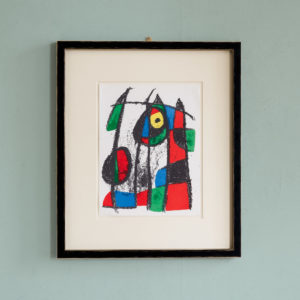
Joan Miró, Lithographie originale
£500Joan Miró, Lithographie originale
Joan Miró produced nearly 1,800 original lithographs and prints at the Maeght studio. He composed his score, invented his alphabet, scattered his symbols across the white page of his writing, close to graffiti. Everything was free, released, aerial, penetrated with interior light. He celebrated marriages between all techniques. Nothing was ever excessive or gratuitous. His creation cut to the essential. Miró created his own language. Dots, lines, scratches, graffiti, writing, mysterious anthropomorphic figures swimming or flying through infinite territory, fed by sparks. The power of black, awestruck colors… And the paper always defended its whiteness. Miró was about drawing above all else. His energy burst on to the sheet.£500 -
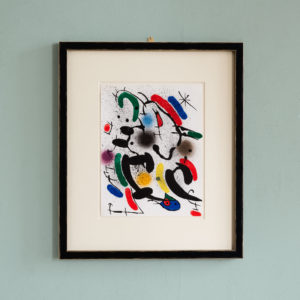
Joan Miró, Lithographie originale
£500Joan Miró, Lithographie originale
Joan Miró produced nearly 1,800 original lithographs and prints at the Maeght studio. He composed his score, invented his alphabet, scattered his symbols across the white page of his writing, close to graffiti. Everything was free, released, aerial, penetrated with interior light. He celebrated marriages between all techniques. Nothing was ever excessive or gratuitous. His creation cut to the essential. Miró created his own language. Dots, lines, scratches, graffiti, writing, mysterious anthropomorphic figures swimming or flying through infinite territory, fed by sparks. The power of black, awestruck colors… And the paper always defended its whiteness. Miró was about drawing above all else. His energy burst on to the sheet.£500 -
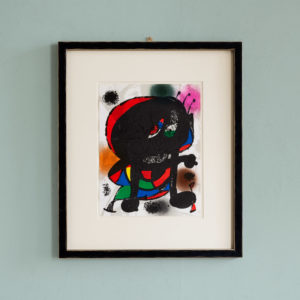
Joan Miró, Lithographie originale
£500Joan Miró, Lithographie originale
Joan Miró produced nearly 1,800 original lithographs and prints at the Maeght studio. He composed his score, invented his alphabet, scattered his symbols across the white page of his writing, close to graffiti. Everything was free, released, aerial, penetrated with interior light. He celebrated marriages between all techniques. Nothing was ever excessive or gratuitous. His creation cut to the essential. Miró created his own language. Dots, lines, scratches, graffiti, writing, mysterious anthropomorphic figures swimming or flying through infinite territory, fed by sparks. The power of black, awestruck colors… And the paper always defended its whiteness. Miró was about drawing above all else. His energy burst on to the sheet.£500 -
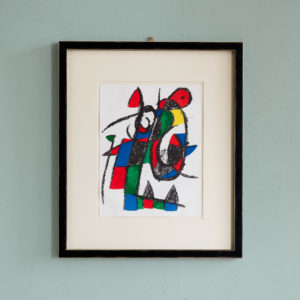
Joan Miró, Lithographie originale
£500Joan Miró, Lithographie originale
Joan Miró produced nearly 1,800 original lithographs and prints at the Maeght studio. He composed his score, invented his alphabet, scattered his symbols across the white page of his writing, close to graffiti. Everything was free, released, aerial, penetrated with interior light. He celebrated marriages between all techniques. Nothing was ever excessive or gratuitous. His creation cut to the essential. Miró created his own language. Dots, lines, scratches, graffiti, writing, mysterious anthropomorphic figures swimming or flying through infinite territory, fed by sparks. The power of black, awestruck colors… And the paper always defended its whiteness. Miró was about drawing above all else. His energy burst on to the sheet.£500 -
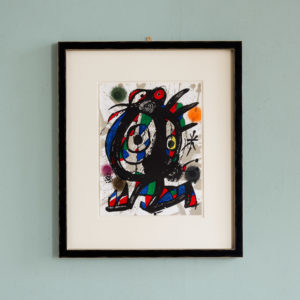
Joan Miró, Lithographie originale
£500Joan Miró, Lithographie originale
Joan Miró produced nearly 1,800 original lithographs and prints at the Maeght studio. He composed his score, invented his alphabet, scattered his symbols across the white page of his writing, close to graffiti. Everything was free, released, aerial, penetrated with interior light. He celebrated marriages between all techniques. Nothing was ever excessive or gratuitous. His creation cut to the essential. Miró created his own language. Dots, lines, scratches, graffiti, writing, mysterious anthropomorphic figures swimming or flying through infinite territory, fed by sparks. The power of black, awestruck colors… And the paper always defended its whiteness. Miró was about drawing above all else. His energy burst on to the sheet.£500
Featured Items
-

Henri Matisse, ‘The Last Works of Henri Matisse’
£900 eachHenri Matisse, ‘The Last Works of Henri Matisse’
From Verve Vol. IX No. 35/36 published by Tériade under the title 'The Last Works of Henri Matisse'£900 each -

The Dance, by Henri Matisse, Jan – March 1939 / No. 4.
£1,200The Dance, by Henri Matisse, Jan – March 1939 / No. 4.
The Verve Review was a purposefully luxurious. It ran from 1937 to 1960, but with only 38 editions available, due to the high degree of design and editorial work dedicated to each issue. Each edition contained unique lithographic prints, commissioned by the editor, and each cover a double-page lithograph elaborated by one of the artists contained within. It was the brainchild of its editor Stratis Eleftheriades, a Greek National who moved to Paris in the early thirties to take part in the growing Modernist movement, writing under the name of Teriade.£1,200 -

Portraits Part II by Constantin Guys, Verve Vol 2 / No. 5-6.
£500Portraits Part II by Constantin Guys, Verve Vol 2 / No. 5-6.
The Verve Review was a purposefully luxurious. It ran from 1937 to 1960, but with only 38 editions available, due to the high degree of design and editorial work dedicated to each issue. Each edition contained unique lithographic prints, commissioned by the editor, and each cover a double-page lithograph elaborated by one of the artists contained within. It was the brainchild of its editor Stratis Eleftheriades, a Greek National who moved to Paris in the early thirties to take part in the growing Modernist movement, writing under the name of Teriade.£500 -

The Four Elements, Earth by Francisco Bores, Verve Vol. 1 / No. 1.
£600The Four Elements, Earth by Francisco Bores, Verve Vol. 1 / No. 1.
The Verve Review was a purposefully luxurious. It ran from 1937 to 1960, but with only 38 editions available, due to the high degree of design and editorial work dedicated to each issue. Each edition contained unique lithographic prints, commissioned by the editor, and each cover a double-page lithograph elaborated by one of the artists contained within. It was the brainchild of its editor Stratis Eleftheriades, a Greek National who moved to Paris in the early thirties to take part in the growing Modernist movement, writing under the name of Teriade.£600

